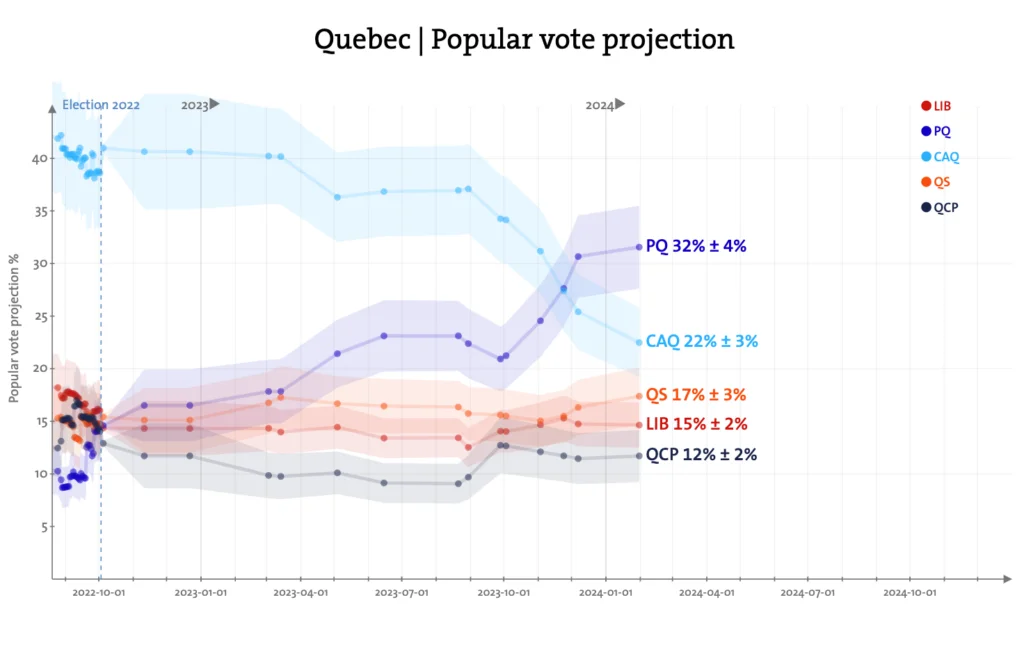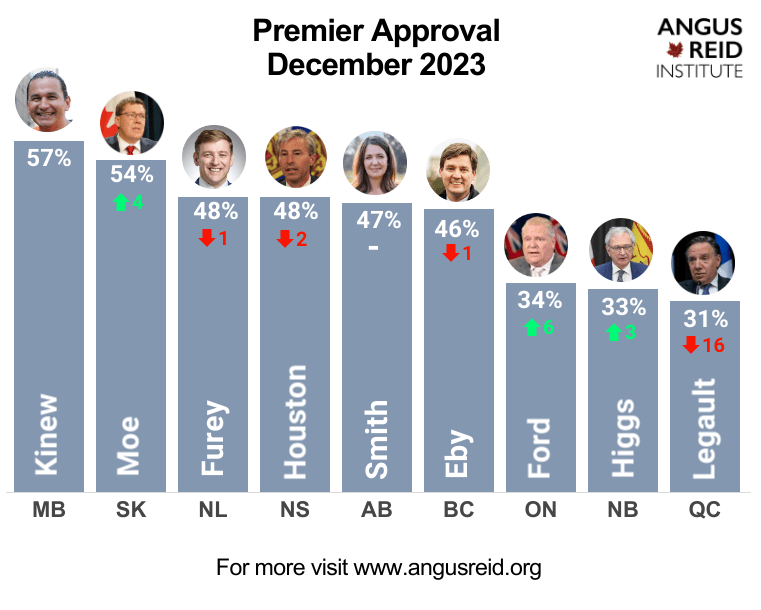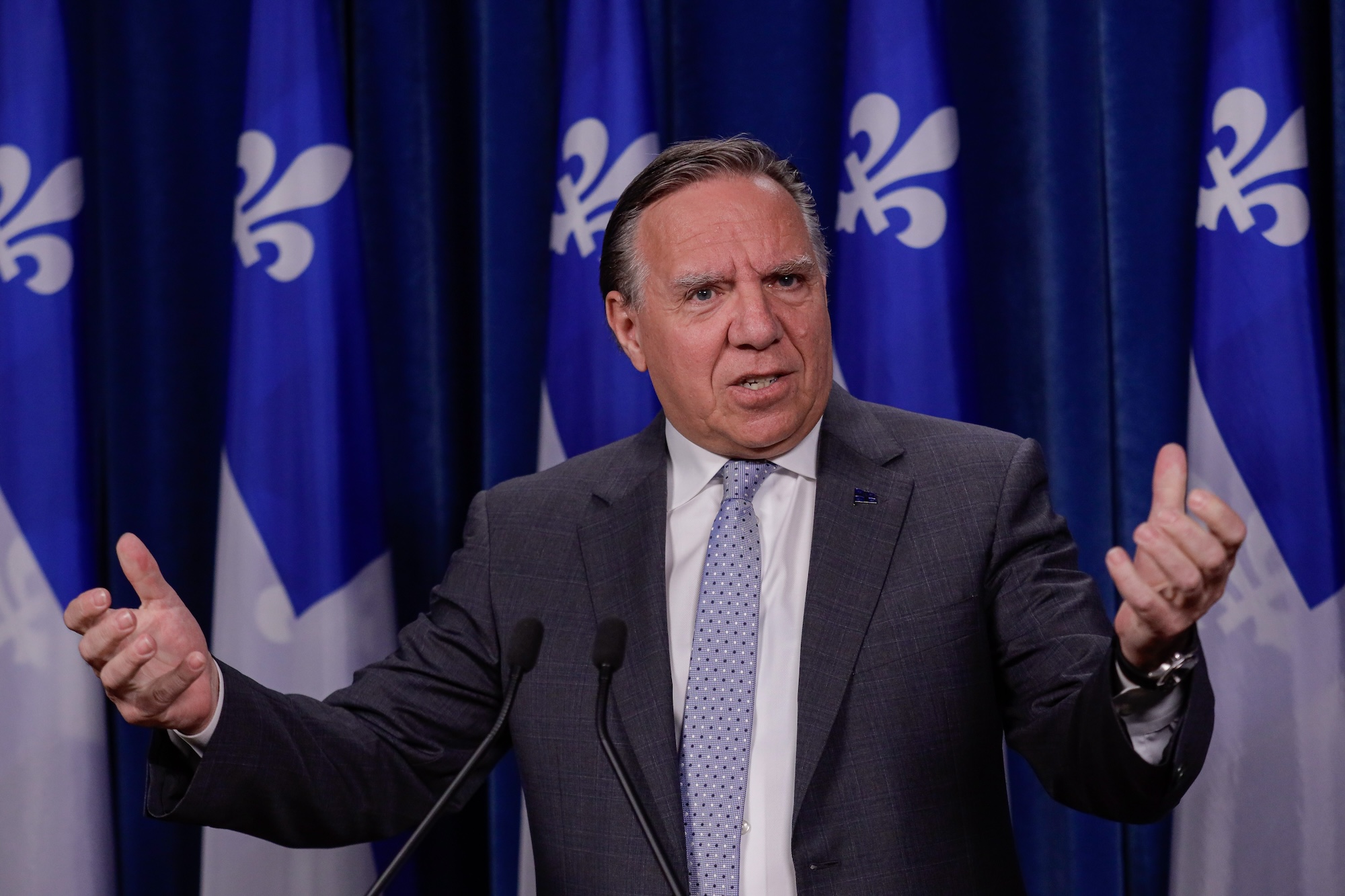Québec’s National Assembly began a new parliamentary session on Tuesday, January 30, after the annual winter break.
With the Coalition Avenir Québec (CAQ) government in the middle of its second majority mandate, before the 2026 provincial election, Premier François Legault and his team is looking to stop and reverse a year-long slide in support among voters, including a drop in popularity of the premier himself. The past year has seen Legault go from the provincial leader with some of the highest support in polling after the 2022 provincial election, to the lowest level of support as of December 2023, according to the Angus Reid Institute.
Ahead of the start of the new legislative session, on January 24 Premier Legault told his caucus at a meeting in Sherbrooke that he wanted his government to focus on five key priorities, on top of housing: education, health, the economy, the environment and Québec identity, and to avoid “distractions.”
Political context
A turbulent end to 2023 for the CAQ appears to have continued into the new year for the premier and cabinet. Premier Legault and his CAQ government continue to slide in the polls after a string of unpopular actions since its re-election. The Legault government raised MNA salaries by 30 per cent, provided a grant to the Los Angeles Kings NHL team as an incentive to play a pre-season game in Québec City and resurrected the Third Link transit connection to Québec City to end the year with a record low in support among the public.
On the economic front, it appears the provincial government intends to delay its goal of delivering a balanced budget by 2027-28. At the CAQ caucus retreat where the premier identified the economy as one of his government’s key priorities for the year, Finance Minister Eric Girard spoke to media and said the provincial economy is slowing down while government revenues are falling and spending is on the rise. While he did not directly answer questions about the objective of returning to budget balance by the end of the government’s current mandate, he did admit that deficits will be bigger and that “everything will be disclosed in the budget,” which will be delivered later in the spring.
For his part, Economy Minister Pierre Fitzgibbon and Invest Québec remain focused on achieving a quasi-industrial revolution with its energy transition and battery supply chain. Guy Leblanc, the former CEO of Invest Québec, said in late 2023 that investment in the battery sector could be doubled in the coming years to reach $30 billion. Leblanc’s replacement is Bicha Ngo, who is intent on continuing the advancement of the battery industry.
That said, the questions of electricity supply, transmission and the social acceptability of major projects have complicated measures such as the anticipated “Régie de l’énergie”, the governance of Hydro-Québec legislative review and the Northvolt battery plant fast tracked environmental evaluation. The latter have presented major issues for the CAQ’s ambition, raising concerns about the government’s credibility, and contributing to their sagging poll numbers.
It appears the Legault government also faces an uphill struggle when it comes to distractions from the five priorities the party wants to address over the next two years of its mandate.
The premier spent much of the first week of the legislative session facing questions about the integrity of the government and cabinet in light of news that six CAQ MNAs were being investigated by the province’s ethics commissioner for allegations of selling access to ministers through political donations and fundraising events. The opposition Parti Québécois called for changes to political financing rules and to make it illegal for ministers to attend fundraising events, or “cocktail” fundraisers.
To address these allegations, Legault announced that as leader of the CAQ, he would be ending private political donations to the party, requested the opposition parties do the same and suggested he would be open to drafting new rules for political donations to all parties in the future. The decision from Legault comes with consequences, the CAQ has raised just under $1 million per year through private donations since taking office in 2018.
In a press conference from the National Assembly on Thursday, Premier Legault was at times defensive about the perception of the integrity of his caucus, saying “it’s important, the image of integrity. At least for me… I want our ministers to meet with the mayors, to meet with the population. I think it’s important to continue meeting, but not in exchange or not asking for any money.”
On the health file, the government will be focused on rolling out the institutional changes identified in Bill 15, which was passed in December and will be implemented between now and April 2025. This includes the establishment of Santé Québec, a new central agency to oversee the delivery of health services in the province. The members of the transition team that will lead efforts on Santé Québec was announced in early January, and Health Minister Dubé intends to name a CEO in the coming months.
Liberal party leadership
Following the Québec Liberal Party’s (PLQ) announcement that it would not be choosing its new leader until spring 2025, multiple candidates have come forward. Denis Coderre, former mayor Montreal and federal Liberal cabinet minister, has confirmed that he is considering running to become the leader of the party, with interim leader Marc Tanguay stating he would be a “quality candidate.” Others who have expressed interest include Liberal MNA Frédéric Beauchemin, who was recently reinstated to the caucus after being excluded last October due to complaints of psychological harassment lodged against him.
Meanwhile, a source from the PLQ has stated that François-Philippe Champagne, currently the federal minister of industry, science and innovation, generates the most interest amongst Québec Liberals. The minister has not ruled out the possibility of seeking the party’s leadership, but also hasn’t directly expressed his interest in making the jump to provincial politics.
Polling
The CAQ is entering the second quarter of their 4-year mandate, with the next election slated for fall 2026. Over the last few months, the party has experienced a significant drop in support according to provincial polls. Meanwhile, the Parti Québécois (PQ) young and charismatic leader Paul St-Pierre Plamondon has been successful in harnessing negative attitudes and distrust of the CAQ to fuel his party’s rise in popularity.

Premier Legault is also increasingly unpopular as leader, ending 2023 with 31 per cent approval rating among voters in the province, according to the Angus Reid Institute, after reaching a high of 57 per cent approval in December 2022.

Legislation to watch
- Bill 31: An Act to amend various legislative provisions with respect to housing
- Bill 41: An Act to enact the Act respecting the environmental performance of buildings and to amend various provisions regarding energy transition
- Bill 42: An Act to prevent and fight psychological harassment and sexual violence in the workplace
- Bill 46: An Act to improve the protection of children receiving educational childcare services
- Bill 47: An Act to reinforce the protection of students
- Bill 51: An Act to modernize the construction industry
